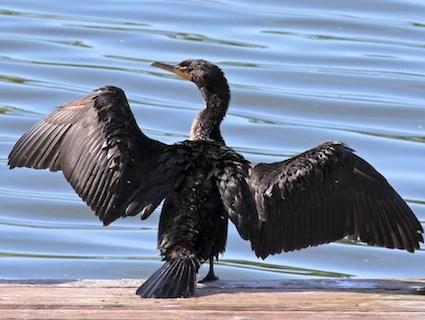Double Crested Comorants Pose Danger for Private Lakes, Fisheries
Lochow Ranch Pond and Lake Management warns that large flocks of Cormorants can consume forage fish in private lakes and fisheries. Be on the look out for them when birds migrate in Texas.

Lochow Ranch Pond and Lake Management has a warning for private lakes and fisheries about the Double Crested Cormorant. Migratory birds will be moving through the state this time of year. Most are benign, however it is necessary to be on the lookout for Double Crested Cormorants. Each individual Cormorant can consume around three pounds of fish daily.
While a few individuals are not a huge concern, large flocks can consume thousands of dollars in forage fish each day.
There are many deterrent methods that can be effective at times such as: propane cannons, alligator heads, scare crows, monofilament lines and drones. These deterrent methods should be supplemented with direct human disturbance as often as possible. Remember all migratory birds are protected, including cormorants, so any deterrent methods must be non-lethal.
View this video on Comorants. https://youtu.be/eql2TL5z3Dk
If a fishery, pond, or lake has been damaged by predators, it will be important to conduct an electrofishing survey this coming spring to evaluate the fishery and determine if corrective actions are needed. Electrofishing can determine "after-predator" fish population densities.
Electrofishing is a scientific method whereby the fish are stunned briefly, causing no long term negative effect to the fish population. An electrofishing survey determines abundance, population density and other characteristics of the fish population. Each fish is weighed, measured and released unharmed. They return to their normal state in a matter of a few moments. Electrofishing is an excellent tool for correcting an out-of-balance body of water. Stunted fish or unwanted species can be easily and quickly removed.
Lochow Ranch Pond and Lake Management uses a top-of-the-line electrofishing boat to accurately and effectively assess fish populations so lake and pond owners can take action to make their respective body of water all it can be. Serving Texas, Oklahoma, and Louisiana, their expert biologists, technicians, and other professionals can meet goals of putting ecosystems back in order.

